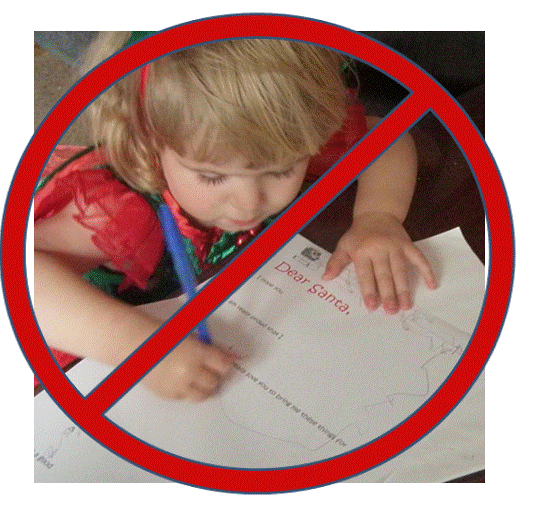The Mothers Union in England has apparently called for an end to children writing letters to Santa.
Let that sink in for a moment – …
A case of bah humbug?
We’ll get to what I think in a moment, but the reason behind their request is to reduce the pressure on parents to buy expensive Christmas presents. And that is not a bad thing, especially with financial concerns around the world.
The Mother’s Union, a Christian charity, has research results indicating about 46% of parents take out a loan or get into financial trouble to ‘please children during the holidays’ (which could mean more than just buying presents but we’ll let slide for now).
Parents take out loans to pay for Christmas?
That staggered me. I can’t imagine taking a loan for presents – the only loan I’ve ever taken was to buy a house!
So reducing pressure on parents is a reasonable motive for cancelling letters to Santa.
What are letters to Santa?
According to the Mothers’ Union, letters to Santa are nothing more than commercialised lists of things children want.
To be fair, very few Santa letters wouldn’t include a version of ‘could you please bring me…’ so they are lists of requests.
But (actually there are a few buts to this!) the key word there is requests – just because a child asks for the $200 latest gadget it doesn’t mean that child has to get it. Or even should get it.
Santa and parents make decisions about what is a reasonable price to pay and what is a suitable gift for that child’s age, abilities and needs. Sometimes, those decisions mean saying no to kids.
Santa is incredibly generous but the Santa I know is wise enough to realise kids don’t always know best and can learn from not getting everything they ask for.
But letters to Santa offer more than a list writing exercise.
Writing letters to Santa develops writing and communication skills.
With adult direction, letters to Santa are also polite and teach manners and gratitude.Click To TweetA good letter to Santa will ask how Santa is and tell Santa some news, not just list things the child wants.
It can also be a good time to reflect on the year and let the child think about their behaviour. They may be able to apologise in their letter or share pride in achievements and good deeds.
Santa may be an adult that children can trust and express things to in a letter in a time when many wouldn’t write to many other people.
In other words, letters to Santa can be much more than a commercialised list, and perhaps encouraging the positive aspects would be more effective than banning them.
Letters to Santa can be much more than a commercialised listClick To TweetBut not all kids ask for expensive things.
For ten years I have been helping Santa write letters to Australian children at Christmas time.
For many years I have been involved with children – cousins, children I cared for professionally and then my own children and their friends.
I’ve read a number of letters and heard children’s wishes. You maybe surprised how many affordable things children ask for. Books, pencils, lollies, clothes, cooking tools and CDs are frequently on those lists.
And I’ve seen many children delighted over inexpensive gifts.
Stop letters to Santa?
Instead of stopping children writing to Santa, how about we focus on them writing real letters, not just lists?
How about we focus our children on the spirit of Christmas, not the biggest gifts?Click To TweetSomething like our Dear Santa template and notes for writing a nice letter to Santa can make writing to Santa positive. Wouldn’t it better to hand out such tools to all the kids at school than to make a statement that is unlikely to be followed through anyway?
What are you going to do – will you stop your kids writing to Santa to reduce the commercialism of Christmas and the pressure on families?


I think that writing letters to Santa is a great tradition (and fantastic tip for parents what kind of present the child would like to receive).When I was a child my mum encouraged me every year to write such a letter and draw something nice and related to Christmas for Santa (Christmas Tree for instance). Then I put my letter on the windowsill in my room and it “mysteriously” dissapeared when I was sleeping. I’m happy that my children continue that beautiful tradition.
Thanks for adding your thoughts, Trissandra. Writing to Santa is a beautful tradition and has warm memories for so many of us – I wouldn’t want my kids to miss those warm memories.
I so agree with you on this one. Although, the mothers union has a valid concern that they don’t like kids making list about material things. But I think that making them give up writing to Santa is like taking away some of the magic of Christmas. As I said I agree with you, instead of taking away writing to Santa how about teaching a kid about the magic of Christmas. Teaching them that there’s more to Santa then bringing them toys. Teach them that giving can be just as important as getting.
Great to have your agreement, pafjlh. I agree that removing some of the commercialism and greed is a good aim, but let’s keep the Christmas magic and us it to teach better values instead of squashing it.
No Way! This tradition is one which is far more than a “list writing exercise”. In our family, you aren’t allowed to ask for material things — and so our letters to Santa tend to be quite humorous and long-winded. My kids especially enjoy reading the letters which older generations wrote over the years. It has been a wonderful way of preserving the past for our family.
Definitely, no way! This is really not just a simple or an ordinary letter. For kids, their hearts are on their letters. I think parents are mature and responsible enough to know how to handle this.
You’re so right, Vida, these aren’t just any old letter and carry a real signficance for kids.
And I think we should respect parents as responsible and able to teach values to children rather than telling them to cancel something as if parents can’t deal with it or say no to kids.
Another voice against cancelling letters to Santa is Ally Fogg at The Guardian in the UK. He wrote a letter to Santa asking him to talk to the Mothers Union basically. Like me, he suggested using the letters to thank Santa and learn lessons about life. I don;t agree that Christmas is about disappointment, but I do agree that its ok to say no to kids and let them realise they won’t always get what they want (or even ask for).
I think letters to Santa should not be stopped, and yes parents should encourage children to write real letters and not just lists. Even if children asks for expensive things, it would be based on good parental skills and guidance to let the children know it is okay if children do not get exactly what they wanted and help them appreciate the gifts they receive because, really, the value is in the act of giving and not in the gift itself. getting a loan just to please a child’s expensive taste is absurd. There are things that should be given more priority than expensive gifts.
Absolutely, darkmeiji, _ agree 100% with you.
I’d almost forgotten about that loan statistic – it blows my mind anyone would even think of doing that.
Oh this just breaks my heart! Letters to Santa is a tradition for many families. I think it would be beneficial if parents would encourage their children to tweak their letters. Ask for 1 thing they want, 1 thing the needs, 1 thing that would help someone they know, and 1 thing that could help the world. We should instill in children that it is better to give than to receive and hopefully they will grow up and see that Christmas isn’t a selfish time to get gifts, but to also wish good on others too!
I like your framework for the things to ask for, GSBryce – it’s very nice indeed.
Some kids in Scotland wrote a letter to Santa asking for his help in saving their school – including historic buildings and teachers’ jobs. Doesn’t sound greedy to me – this is the sort of heartening thing that can happen when kids have an outlet such as writing to Santa – I believe their faith will lead them to solutions .
I do think it is better to turn it into a positive and a learning experience rather than boycott. So, to teach children about generosity and kindness in writing letters to Santa would be much better than cancelling letters to Santa.
Good to have your agreement, Clauzetta 🙂 There often is a way to find the positives and learning instead of assuming the worst, I think.
I find this ridiculous. Who are these mothers who think they can dictate to others what their children should and shouldn’t do? I do agree that Christmas should be about more than material thngs, but who am I to tell people how to teach that to their kids?
I agree, dhrynio, that this group has gone too far with their good intentions.
It is something that has taken me a long time to learn. I do not have the right to tell or legislate how anyone else raises their kids. There are laws in place for things that are unacceptable (physical abuse, sexual abuse etc) but everything else is a personal choice for a parent to make for their own child and no one has the right to tell them what they can or can’t do. Groups like this mothers group have good intentions, I am sure, but the reality is that they are far overstepping their bounds by trying to push legislation for something that is a parental choice.
Well done on learning that, dhrynio, and accepting that all people can do things differently and not be ‘wrong’. I think it is much more important to support parents and give them resources and alternatives to consider than to try forcing them to act any particualr way.
I just discovered a website called 3things that is about young Australians showing they are not all “me me me” – it gives them opportunities to help others in meaningufl ways. There are obviously many young Aussies who want to make a difference and not just asking Santa for things out of greed.